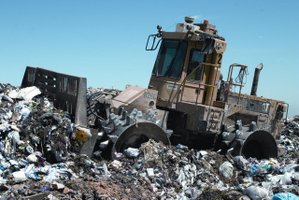Difference between revisions of "Recycling"
(→Relevance in Space) |
|||
| Line 2: | Line 2: | ||
{{backto|Material}} | {{backto|Material}} | ||
[[Image:Recycling.png|right|100px]] | [[Image:Recycling.png|right|100px]] | ||
| − | If we can develop waste systems that recycle nearly all unneeded objects and materials, it would means that only a small percentage of the total required raw materials for manufacturing goods and constructing buildings need to be extracted from the ground. There is no reason why this is not technically possible. | + | If we can develop waste systems that recycle nearly all unneeded objects and materials, it would means that only a small percentage of the total required raw materials for manufacturing goods and constructing buildings need to be extracted from the ground. |
| + | |||
| + | We can move from a linear resource chain to a circular one, in which the outputs of consumption become the inputs of production. | ||
| + | There is no reason why this is not technically possible. Proof that a circular resource chain is possible comes from nature, which recycles all [[Fundamental resources/Material|material]] in a closed loop. | ||
Currently modern society is vastly inefficient, dumping perfectly good material back into the ground {{em}} creating ugly and environmentally hazardous wasteland dumps {{em}} while simultaneously creating further wasteland through quarrying, mining and deforestation. This can be reduced massively by engineering sophisticated recycling systems. | Currently modern society is vastly inefficient, dumping perfectly good material back into the ground {{em}} creating ugly and environmentally hazardous wasteland dumps {{em}} while simultaneously creating further wasteland through quarrying, mining and deforestation. This can be reduced massively by engineering sophisticated recycling systems. | ||
| Line 14: | Line 17: | ||
*Production of all parts with indelible barcodes or embedded RFID tags. | *Production of all parts with indelible barcodes or embedded RFID tags. | ||
*Recycling plants that can disassemble any product whether its components are tagged or not. Tags identifying components are likely to speed up the process if present. | *Recycling plants that can disassemble any product whether its components are tagged or not. Tags identifying components are likely to speed up the process if present. | ||
| + | |||
| + | ==Biorecycling== | ||
| + | We can study the processes that recycle materials in the biosphere and use these processes for our own purposes. Bacteria can be found (or engineered) that will decompose nearly any kind of waste. By using a controlled environment and catalysts, we can greatly accelerate this process. For example, plastic bags have been biodegraded in three months | ||
| + | <sup>[http://www.wired.com/wiredscience/2008/05/teen-decomposes/]</sup>, and bacteria can be used to extract metals from old electronics<sup>[http://www.youtube.com/watch?v=ZSJdD5VXhZw]</sup>. | ||
==Re-using== | ==Re-using== | ||
| − | Also relevant in the big picture is making maximum use of an artifact by letting someone else have it after it has finished being useful to the current owner, rather than binning it. People often hoard, or dispose of, many items that would be perfectly useful to other people. More sophisticated initiatives along the lines of eBay, charity shops and [http://www.freecycle.org Freecycle] could additionally improve mankind's resource efficiency further. | + | Also relevant in the big picture is making maximum use of an artifact by letting someone else have it after it has finished being useful to the current owner, rather than binning it. People often hoard, or dispose of, many items that would be perfectly useful to other people. More sophisticated initiatives along the lines of eBay, charity shops and [http://www.freecycle.org Freecycle] could additionally improve mankind's resource efficiency further. This is become possible only recently thanks to modern digital communications. |
== Relevance in Space == | == Relevance in Space == | ||
Latest revision as of 03:38, 14 September 2010
|
Detailed tour:  previous page | next page
previous page | next page 



